Here’s Why You Should Toss Out Junk Food
5 reasons ultra-processed foods erode your brain health
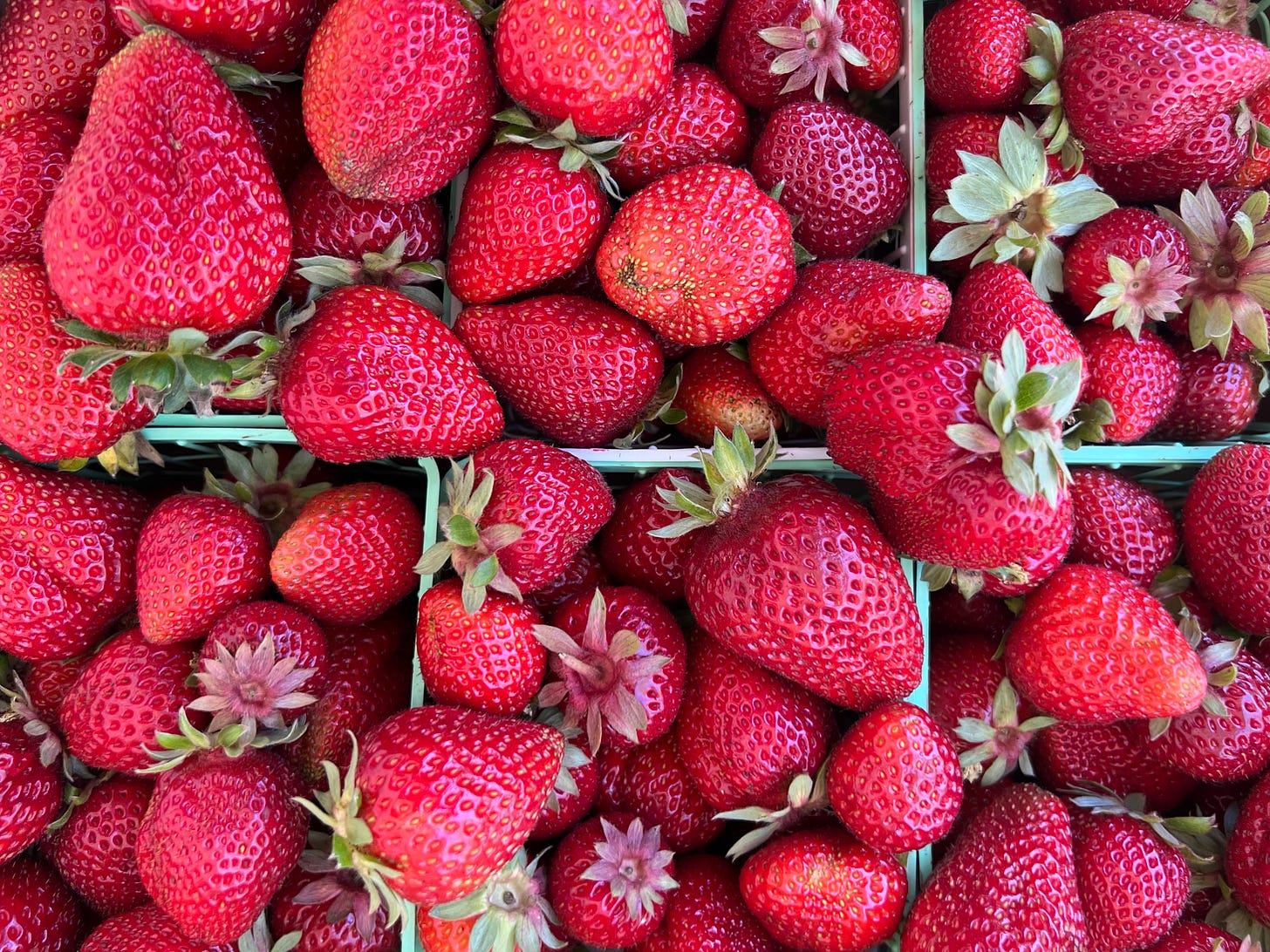
Hello, everyone. I write to you from Northern California where near constant rain has turned everything unbelievably green. At the farmers market, I felt like I hadn’t tasted a real strawberry in, well, almost a year—incredibly sweet and fragrant. It’s the home stretch of my book tour, and this week has been jam-packed. A highlight: cooking with students at Stanford Medical School on Wednesday. I feel hopeful about the future knowing young doctors care about healthy food.
Today I’d like to share some new information about ultra-processed foods (UPFs). We all know junk food is not good for us. Now, thanks to several recent large-scale studies, we can quantify exactly how bad these foods are for brain health. Some processed foods are easy to spot—things like soda, energy drinks, potato chips, and candy. Others are more tricky. They may seem healthy (microwave popcorn and roasted nuts come to mind) but firmly belong in the trash.
What is it about UPFs that erode at our brain health? I’ll share 5 emerging concepts about how these foods impact the brain. Then, I’ll walk you through how to spot the worst culprits and rid your home of these brain-harming foods.
More than an occasional indulgence
Here’s an astounding statistic: UPFs now account for more than half of calories consumed in the U.S., Canada, and the U.K. The evidence is mounting that eating these foods increases the risk of heart disease, diabetes, obesity, and dementia, including Alzheimer’s. Even the New York Times is getting the word out: UPFs are bad for you.
5 ways ultra processed foods are bad for brain health
UPFs make anxiety and depression worse. It’s been known since 2017 when the SMILES trial came out that following a Mediterranean-style diet helps those living with anxiety and depression get better. Now, we have data to say that UPFs make these mental health challenges worse. In this study of over 10,000 participants, those who consumed the most UPFs were more likely to be anxious and suffer mild depression. And this one from Italy found that the more UPFs a young adult consumes, the more likely they are to experience depression. That may be because a junk food diet is deficient in essential brain health nutrients like DHA and EPA, B-complex vitamins, and fiber, while fueling neuroinflammation with sugar and unheatlhy fats.
Removing UPFs from the diet reduces dementia risk. This large-scale study of more than 72,000 participants looked at the impact of UPFs on cognitive health. The authors asked the question: what happens when you cut back on 10% of the UPFs? Well, if you replace those junk foods with an equivalent proportion of unprocessed or minimally processed foods, dementia risk goes down by 19%.
Junk food impacts thinking skills. Another study of over 15,000 people found a linear relationship between UPFs and cognitive decline. Those who consumed UPFs in the top quartile of the group showed a 28% faster rate of cognitive decline. This was especially evident for executive function skills, or the ability to finish complex tasks expeditiously. Junk food eaters had a 25% faster rate of executive function decline.
UPFs are bad for the gut microbiome. When the trillions of microbiota that live in your gut encounter the ingredients in junk food, they see them as foreign and mount an inflammatory response. Poor gut health spills over into the brain and fuels the neuroinflammation that creates an environment that accelerates Alzheimer’s.
Junk food choices reduce adherence to a Mediterranean diet. As this study shows, less brain-healthy foods make it onto the plate when the diet also includes UPFs like fast food and pastries. As many studies have shown, close adherence to a Medi-style dietary pattern, like the MIND diet, is a powerful tool to prevent Alzheimer’s.
How to tell if a food is an UPF
An UPF is at the most extreme end of the processed food spectrum. It will sport a long ingredient list of additives, binders, and chemicals, but little or no recognizable food.

Not every packaged food deserves to be called ultra-processed. Some are actually smart additions to a brain healthy diet. The NOVA classification, pictured above, details the difference between an UPF (like instant noodle soup) and one that is unprocessed or minimally processed (like pasta and frozen fruit). I like to think of minimally processed foods like canned beans and frozen vegetables as “conveniently healthy.” They provide brain health nutrients (like the omega-3’s in a can of salmon) while speeding up meal preparation.
Here’s how I cleaned out my mom’s pantry when she was diagnosed with dementia
Last time I told you that cleaning out my mother’s pantry was the first thing I did when she was diagnosed with mild cognitive impairment. Some of the worst foods I found were marketed to appear healthy, yet would qualify as NOVA class 4. These included microwave popcorn (made with hydrogenated oils), boxed granola and granola bars, flavored roasted nuts, packaged bran muffins, breakfast cereal, gummy fruit snacks, sweetened oatmeal, pretzels, and Nutella.
Processed dairy and meats are proven brain-harming foods. I tossed the packaged “cheese” balls, cream cheese, sweetened and flavored yogurt and plant milk, and whipped “cream” toppings. The tub of margarine was replaced by a small stick of grass-fed butter, and I replaced her long-expired olive oil with a fresh good-quality one. I tossed all the processed meats (lunch meat, hot dogs, salami), too.
In the pantry, I replaced her collection of vegetable and seed oils (safflower, sunflower, grapeseed, canola) with one bottle of good-quality avocado oil. Out went the packaged sweets (muffins, cookies, cake mix) and the frozen processed food (chicken pot pies, TV dinners, pizza).
Finally, I tackled the drinks. My mom had a daily Diet Coke habit, an addiction that proved hard to break. (We weaned her off this over several weeks so as not to induce caffeine withdrawal headaches.) She was also fond of ready-made sweet tea in a bottle, also requiring a slow wean. Since my mom was already diagnosed with dementia, drinking alcohol was off the table. My siblings and I watered down her wine until she wasn’t drinking at all.
Finding healthy swaps is key
I won’t sugar coat it; this was a tough time. My mother was attached to many of these foods and resistant to change. Once these food products were out of the home, however, it only took a few weeks for them to fade away in her memories. Plus, I made sure to find healthier swaps that she liked: Triscuits for Cheez-its, herbal tea (like Celestial Seasons Bengal Tea) for sweet tea, plain Greek yogurt with a drizzle of honey for sweetened and flavored ones, raw nuts and seeds for roasted salted ones, and flavored sparkling water for diet soda.
Don’t wait until you or your loved one has dementia to purge UPFs
It’s been eight years since the big pantry clean-out. My biggest regret is waiting until my mother had dementia to purge these foods from her home. A steady diet of UPFs is a known factor in accelerating dementia; this pantry sweep should have happened years ago. But I am happy to report that my mother transitioned well to eating very close to the MIND diet guidelines, a diet she still follows to this day. Junk food habits can linger for decades, apparently: she still asks for a Diet Coke each afternoon. Nowadays, though, it’s easy to redirect her to a healthier choice.
What about the occasional cheat meal of ultra-processed food?
I’ve long maintained that eating for brain health is not about being perfect. No one is expected to adhere to the guidelines 100% of the time. Progress over perfection, not perfection, is the goal. (I wrote to you about that here.) So what is the impact of cheating every once in a while? Studies haven’t quantified the amount of dementia risk reduction (and other health benefits) you’d give up by eating something like a fast food cheeseburger and fries meal once a month. A meal like this could give you gastrointestinal distress, though. Once you’ve been eating mostly healthy food, your gut microbiota are ill-equipped to digest junk. What we do know is this: 10% of calories from UPF is too much, translating to significant brian health losses. So if you end up eating some junk food, try not to dwell on it. Make sure your next meal is a brain healthy one, and revisit your goals of eating this way. We are all just doing our best.
What is the UPF you’ve had the most difficulty giving up? What are your favorite brain healthy swaps?
Heading home

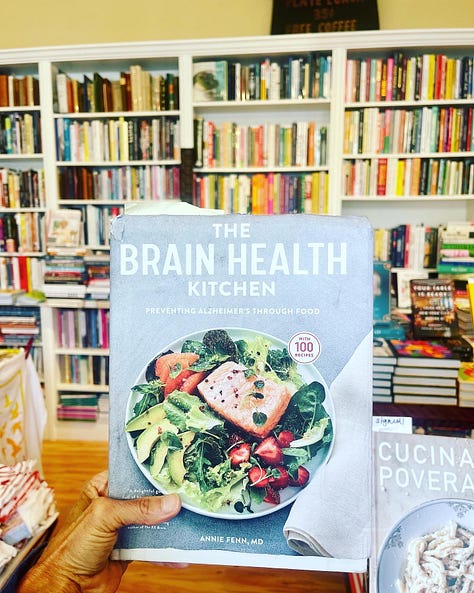


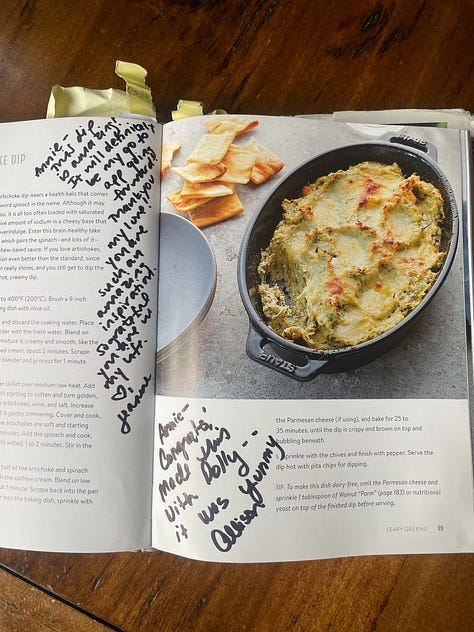

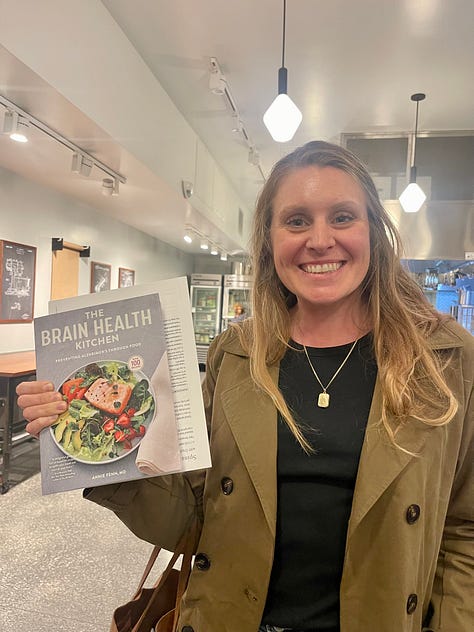
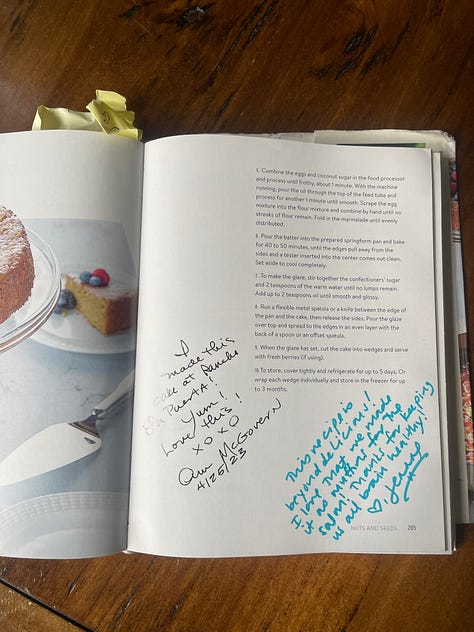
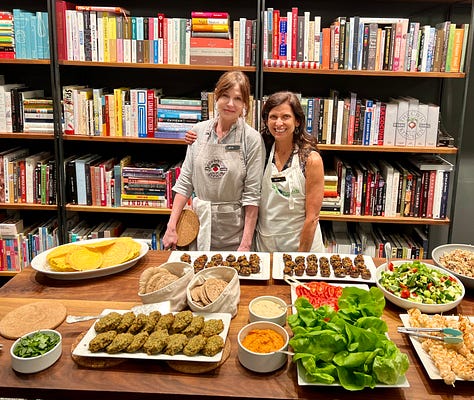
If you’ve been following along on my book tour, you know it’s been nonstop. Just this week I’ve given two presentations, three cooking classes, and signed hundreds of books. So I thought it would be fun to show you my tattered copy of The Brain Health Kitchen book. I’ve been treating it like a school yearbook and each page is full of notes from students, recipe testers, indie bookstore owners, friends and family, and anyone who supported me and the book. Whenever I open the book, I can’t help but smile and feel grateful.


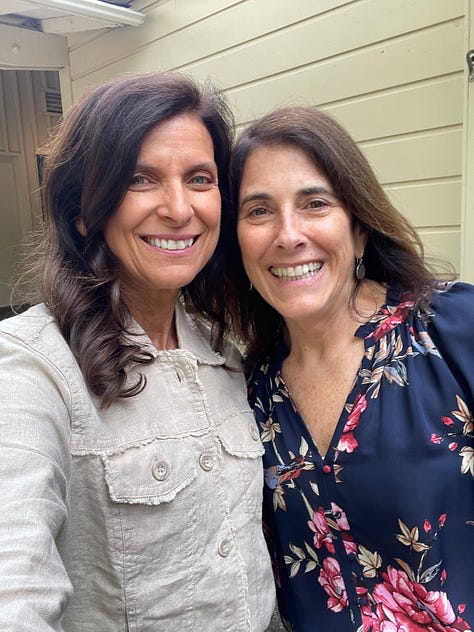




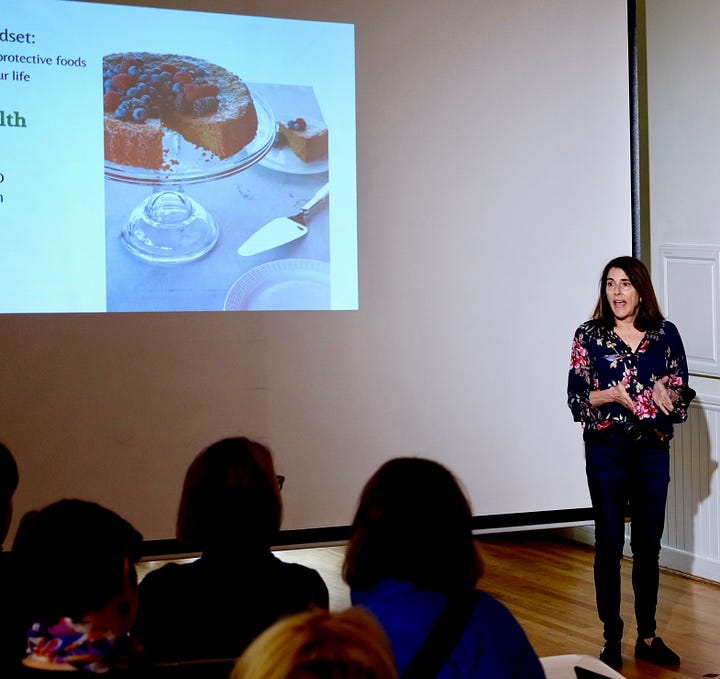
Pictured above row 1: Friend and legendary food writer Dianne Jacob helped coach me on the earliest phase of the book proposal. (Check out her newsletter
!) Celia Sacks, owner of Omnivore, the iconic SF cookbook store. With Dr. Jeanne Rosner of Soul Food Salon before our brain health talk yesterday. Center: Celia and Dianne showing me around the SF Mission neighborhood. Cooking with brain food enthusiast and friend Justyna Lloyd at Civic Kitchen. Gerontologist and Health Educator Sally Duplantier of myzinglife.com. Row 3: Susan Evans of Kensington Senior Living has been sharing BHK recipes with the chefs who cook for her seniors for years. Jeanne introduces me to a sold-out crowd at Soul Food Salon. I’ll share the recording soon.Have a wonderful weekend, friends. Thank you for reading, sharing, and taking the best care of your brains.
Love,
Annie
PS: Mother’s day is next week! My book is still on sale on Amazon and I’m not sure how long that will last. Perhaps your mom would love a book + a BHK newsletter subscription? Or, check out this special Mother’s Day brain health starter kit that includes my book.




Thank you so much Annie! Silly question but I add a ton of unsweetened soy milk to my coffee. I may drink about 3/4 cup soy milk a day. Should I switch to something else? Or maybe I should focus more on tea which I don’t add anything to.
Excellent research and practical advice! Thanks for this great info! I have to admit, there are a few things in my pantry you would toss! 😝